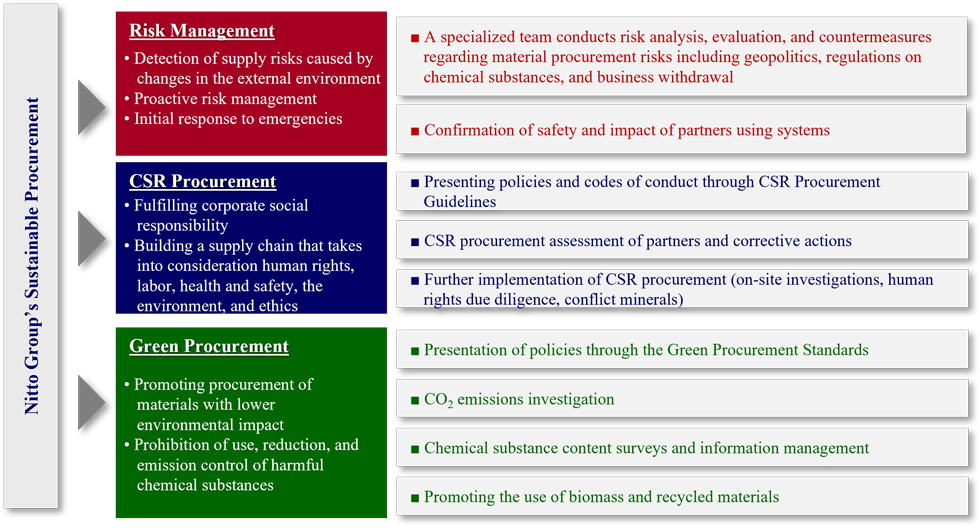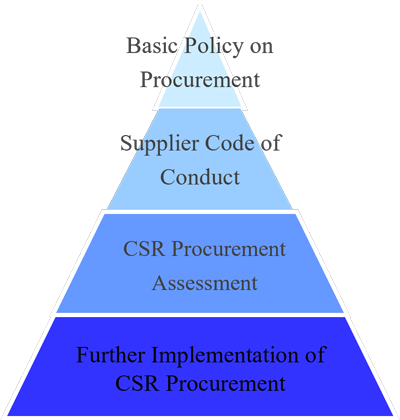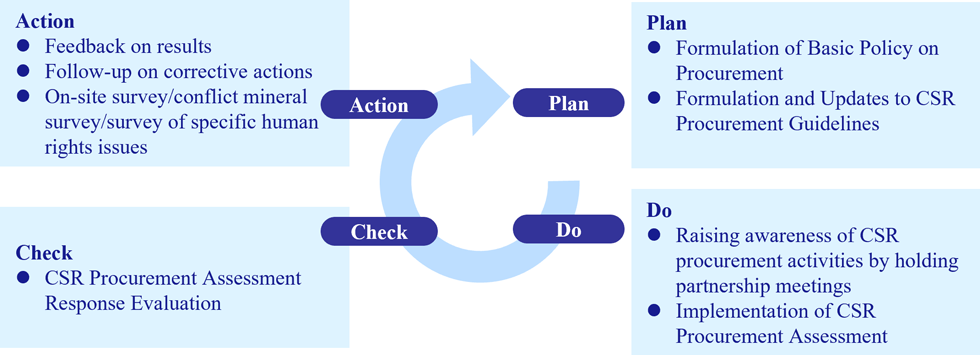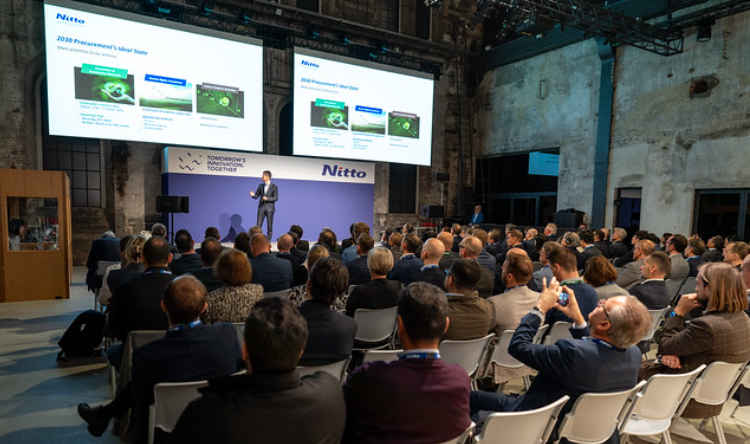The Nitto Group is committed to sustainable procurement activities through initiatives such as "Risk Management," "CSR Procurement," and "Green Procurement." These activities are aligned with the Nitto Group's policy of placing ESG at the core of its management and are implemented through the Supplier ESG Program. The goal of these procurement activities is to identify and mitigate risks associated with supply chain disruptions, human rights violations, and environmental issues such as CO2 emissions reduction, in response to changes in market conditions.
In implementing these initiatives, the Nitto Group works closely with its partners, regularly coordinating and discussing key matters such as long-term order plans and delivery schedules. This ensures that undue burdens are not placed on partners while maintaining a sustainable business environment. These efforts aim to prevent the risk of human rights violations across the supply chain, fostering the development of healthy, long-term business relationships that enable both Nitto and its partners to achieve sustainable growth.
 |
In pursuit of the realization of a sustainable society, the Nitto Group shares values with its partners and works with them to resolve procurement risk issues in the supply chain.
 |
Basic Policy on Procurement: The Nitto Group shares its basic policy for CSR procurement. Supplier Code of Conduct: We set out our expectations to ensure that the Nitto Group and our partners share the same values. The Supplier Code of Conduct was created with reference to the RBA. We raise awareness of Supplier Code of Conduct through partnership meetings attended by our partners and request that they comply with the Supplier code of conduct. CSR Procurement Assessment: We request and collect self-assessment questionnaires (SAQ) with the purpose of checking the status of our partners' implementation of the Supplier Code of Conduct. The SAQ is based on RBA requirements. We feedback the results and then request corrective action. Starting in 2023, we began conducting EcoVadis surveys Further implementation of CSR procurement: We conduct on-site surveys to understand the details of our partners' CSR activities, conduct conflict mineral surveys to investigate and correct procurement risks related to 3TG and other items, and conduct to investigate and correct item-specific human rights issues. |
Our CSR procurement process is carried out through the PDCA cycle as shown in the diagram.
 |
When selecting partners, the Nitto Group places particular importance on ESG (Environmental, Social, and Governance) performance, while also considering price, delivery, and quality. We comprehensively evaluate all of these factors and aim to establish relationships that contribute to greater sustainability. We prioritize suppliers with superior ESG performance in supplier selection and contract awarding, in line with our procurement policy.
To this end, the Nitto Group conducts an annual CSR assessment to support the enhancement of transparency and performance in our partners' CSR activities. We first identify key suppliers through a multi-faceted primary screening, followed by a detailed assessment. The results of the assessment are shared as feedback reports, encouraging voluntary improvements through suggested actions. Furthermore, where necessary, we request corrective measures or improvement plans and, through ongoing support, work together with our partners to build a highly transparent and sustainable supply chain.
 |
To conduct CSR assessments effectively, the Nitto Group first identifies and defines "key suppliers." These include not only those with high total transaction volumes, but also suppliers with significant environmental impact—such as those generating large amounts of CO₂ emissions or waste—suppliers exposed to social risks related to human rights and labor practices (e.g., discrimination, forced labor, or child labor), suppliers critical to business continuity due to supply stability or lack of alternatives, and those assessed as having high governance risks, such as bribery, conflicts of interest, or deficiencies in internal controls. In identifying these key suppliers, we evaluate various risk perspectives, including country-specific, sector-specific, and commodity-specific risks. For example, in assessing country-specific risks, we consider factors such as political stability, legal frameworks, and labor conditions. Using a risk map, we score countries based on the likelihood of issues such as discrimination, forced labor, or child labor, and place particular focus on suppliers located in high-risk countries. For sector-specific risks, we focus on chemical materials—a key procurement area for our group—and assess compliance with regulations such as the EU REACH regulation and domestic chemical management frameworks, along with industry-specific emission control practices. Regarding commodity-specific risks, we evaluate not only metals and chemical raw materials but also emerging risks associated with increased use of bio-based materials, such as food security concerns, land conversion impacts on ecosystems, and water resource usage. These assessments allow us to prioritize suppliers based on both environmental impact and social issues.
To confirm the implementation status of our Supplier Code of Conduct, the Nitto Group requests and collects a self-assessment questionnaire (SAQ) from our partners. This questionnaire is based on the guidelines of the Responsible Business Alliance (RBA) and covers the following areas: Human Rights and Labor, Health and Safety, Environment, Fair Trade, Information Security, and CSR Penetration into the Supply Chain. Partners are asked to provide detailed information on each of these areas, and based on the results, we work together to develop and share concrete action plans aimed at enhancing sustainability. Furthermore, since fiscal year 2023, we have introduced the use of EcoVadis to support the comprehensive evaluation, quantification, and progress tracking of CSR activities. Through this approach, we are strengthening efforts to build a more transparent and sustainable supply chain.
All partner companies receive feedback on their CSR assessment results, including overall scores, category-specific scores, and specific suggestions for improvement. This allows them to understand the current status of their CSR initiatives, recognize their position relative to industry standards and peer benchmarks, and identify clear areas for enhancement. Based on these assessment results, the Nitto Group provides targeted guidance, including requests for corrective actions and detailed advice for improvement, thereby supporting partners in making voluntary improvements and enhancing their long-term capabilities. Through this process, partners are able to strengthen their competitiveness while contributing to the realization of a more sustainable supply chain. The Nitto Group is committed to working closely with our partners to reinforce CSR practices. By developing and implementing improvement plans together, we aim to promote greater transparency, responsible business conduct, and the co-creation of social value. For details on actual implementation outcomes, please refer to our Sustainability Data Book.
Since 2022, the Nitto Group has been organizing “Nitto Supplier Meetings” in Japan and overseas as a platform to share our sustainable procurement policies and environmental and social initiatives with our partners, while fostering mutual value creation. These meetings are designed not simply as interactions between buyer and seller, but as opportunities to strengthen partnerships based on trust and collaboration. In these meetings, we share updates on our sustainability goals, CO₂ reduction initiatives, and efforts to realize a circular economy. We also highlight best practices from partners who have demonstrated outstanding performance, providing insights that all participants can leverage to drive improvement and enhance their capabilities. Through these engagements, the Nitto Group encourages voluntary improvement initiatives by our partners and works together to promote the development of a sustainable supply chain. These efforts contribute to the creation of social value—such as reducing environmental impact and respecting human rights—while also strengthening long-term trust and competitiveness across the value chain.
 |
Nitto Group is actively working to reduce CO2 emissions. In calculating the CO2 emissions of Nitto Group products, we use the emission data calculated by our partners to reflect their reduction efforts in our own CO2 emissions calculations. For this reason, we specifically request that partners submit their CO2 emission data. For partners who find it challenging to calculate their CO2 emissions, Nitto Group organizes specialized workshops and engages in discussions to support the calculation process together.We have already engaged in extensive discussions with many partners and have worked collaboratively on calculating the CO2 emissions of raw materials. Going forward, we will continue to actively discuss the calculation of CO2 emissions and explore methods for further reductions through ongoing dialogue with our partners.
Nitto Group provides training for Nitto Group buyers and stakeholders to deepen their understanding of their roles in our partners’ ESG programs. The vision for the Procurement Department in 2030 is to become a strategic department that supports a sustainable supply chain. In order to achieve divisional targets, we provide the following training, classified into Environmental, Social, Governance, and Other.
The purpose is to reduce the environmental impact throughout the supply chain and establish sustainable business operations. The training provides knowledge and practical skills on managing regulated chemical substances and reducing CO2 emissions. Participants will understand the importance of environmental protection and learn specific methods.
Understand the importance of human rights in business and promote ESG assessment throughout the supply chain. This training provides concrete methods for fulfilling corporate social responsibility and ensuring social fairness through strengthening CSR procurement activities. Participants will learn strategic approaches that improves sustainability throughout the supply chain, while leveraging ESG assessment.
We aim to establish sustainable procurement practices and ensure legal compliance and ethical business operations. This training provides the knowledge and skills to improve reliability and transparency in the procurement department. Participants will understand the importance of procurement regulations and standards and learn appropriate procurement processes.
We improve the basic skills of buyers and procurement departments, leading to more efficient operations and more effective supplier management. Throughout this training, participants will learn skills that are directly relevant to the workplace, such as cost analysis, negotiation skills, and supplier management. Participants will acquire cost analysis methods and effective negotiation techniques, improving competitiveness throughout the supply chain.
Through these training programs, Nitto Group's procurement department will realize a sustainable supply chain and play a strategic role moving toward 2030.